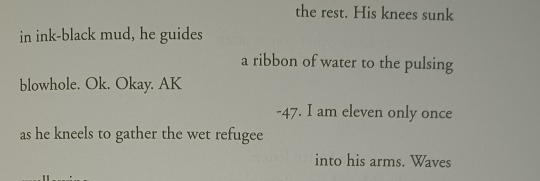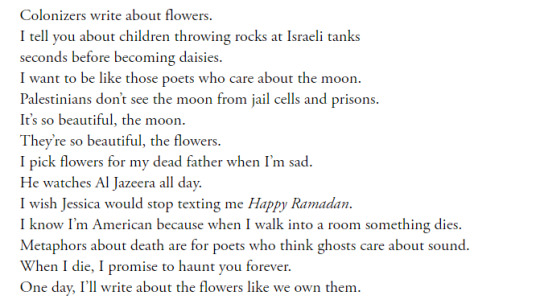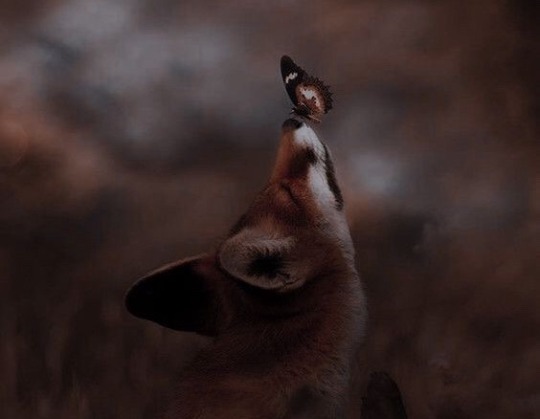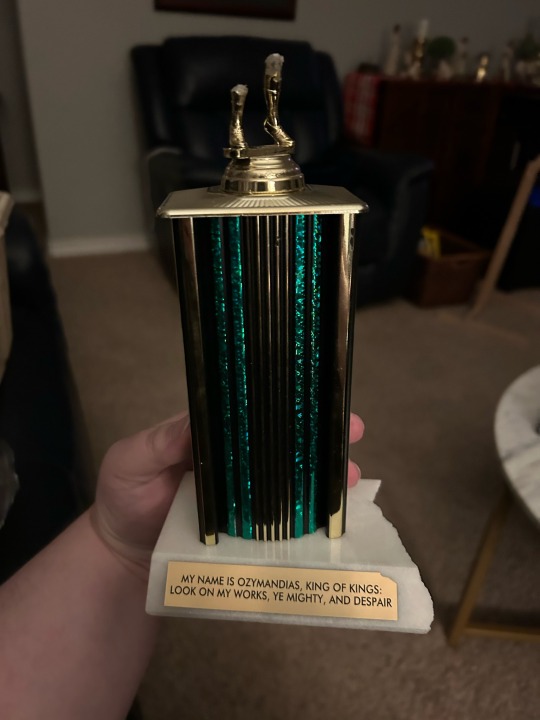#poetry craft
Text
A Mini Dissection of Ocean Vuong's Craft Choices in Night Sky with Exit Wounds
On a recent reread of Ocean Vuong's Night Sky with Exit Wounds, I indulged my rabid fascination with understanding a poet's repertoire of poetic devices and investigating the specific ways they use them in a body of work. This time, I was particularly drawn to specific uses of repetition and rhyme that and the ways they help craft meaning by creating theme and structure throughout the whole collection. Looking at two of the poems from this collection available to read online, I'm going to try to point some of these out.
Repetition Techniques
Vuong uses a lot of repetition in Night Sky with Exit Wounds in general, but the most interesting to me were his use of anadiplosis and his use of repetition as a structural element. These are both evident in the poem Eurydice, specifically here:

In these circled instances, Vuong uses anadiplosis in using a word or phrase at the end of one sentence and then repeating it in the beginning of the next sentence. [Yes, I had to expand my repertoire of literary terms to understand how to refer to what was going on here. Here's a great article on repetition techniques that taught me a ton.] The sentences are then more closely linked than the surrounding sentences, which compels me to read them together for a fuller meaning. In this specific instance, the text expresses instability (things change "depending on where you stand", gravity changes/breaks things) and the language compounds it with its shifting nature, repeating only to diverge. In some other poems, the same technique works as if to destabilize meaning, to establish an understanding of a phrase and then completely shift the context so it means something else. This is incredibly interesting when considering the context of the collection as a whole and how displacement, uncertainty, and the immigrant experience are thematically relevant. This use of repetition then expands on theme and creates a form/content agreement where the text embodies its meaning.
Here, repetition also works as a structural element, linking all the phrases in an almost stream-of-consciousness style. The repeating "depending on where you stand," "your name," and "gravity" connect the sentences and offer momentum and cohesion. This technique grounds even otherwise disjointed poems so they're still easily digestible.
[Note: if you're interested in these usages, I highly recommend checking out Billy-Ray Belcourt's "Duplex (The Future's a Fist)" in NDN Coping Mechanisms.]
Rhyme as Emphasis
Another tendency of Vuong's is to use rhyme to create emphasis, specifically where it elevates theme. Most of the poems in the collection are free verse with no set rhyme scheme and very few rhymes in general. This makes the rare rhyme much more jarring, causing it to emphasize certain words and its associations. For example, this technique adds meaning to the poem In Newport I Watch My Father Lay His Cheek to a Beached Dolphin's Wet Back, in which the rhymes highlight moments of violence and their association with the speaker's state of being.
The first instance is:

The semi-automatic is a signifier of violence, attached through rhyme to the speaker's "static" state (also automatic, as indicated by the enjambment of the phrase). This can, in the poem's context, indicate the jarring difference between the chaos and cacophony of violence and the speaker's opposite reaction of stasis, possibly even representing trauma.

Here, the rhyme between AK-47 and the speaker's age, eleven, makes a connection between violence and youth that lends to the theme of the poem, colouring the speaker's relationship with their father.
Rhyme works to create connections between words that add to meaning and theme throughout most of this body of work.
Bonus: Enjambment
As seen in the poem just above, another technique that theeads the collection is Vuong breaking compound words into their component parts over enjambments. This is present in the first excerpt of the second poem, as it goes "semi / -automatic." This specific use of enjambment can do so many different things, but I'm interested in why it comes up so much in a poetry collection with the themes listed above. I keep coming back to its use as a show of disconnection and fragmentation that feels incredibly relevant to the thematic landscape of the book.
Conclusion
Honestly, the most interesting thing about the choices poets make about when and how to employ certain poetic devices is how it often lends to the "point" of the book as a whole. The content and form echoing each other, in this poetry collection, makes it all so much more visceral and engaging.
#am reading#poetry#poetry craft#poetic devices#poetry craft talk#next i wanna look at k-ming chang's enjambments because i am obsessed w/ them (+more)#ocean vuong#night sky with exit wounds
33 notes
·
View notes
Text
Look for poetry that stirs you: Rhythm
For me, that’s always going to have some punchy rhythm.
Rhythm in poetry is made by word choice, order of words, length of lines and stanzas, etc. It’s easiest to feel it in strictly structured, rhyming poems like Shakespearean sonnets. It’s probably why that kind of poetry gets taught so much in school.
Even if it’s not as obvious with modern and contemporary poetry, language rhythm is…
1 note
·
View note
Text
My first poem!
(Note: This is only for practice, not what I'm going to be submitting in the challenge. My hope is to post poems on here daily to get in more practice. Please share your feedback).
In his father's bedroom he made his stand,
Voicing what was a simple demand.
His voice, clear and strong, desired only this:
To be included in the discussion and not dismissed.
Anger flared as his request was denied,
Desperation in his face, his gaze bright-eyed.
A battle of wills he could not win,
He ran from the room, his head in a spin.
The memory of his shouting lingered in his ear,
And flipping him off still seemed so unreal.
With guilt bubbling in his stomach, he felt weak.
His future with his father had never looked so bleak.
He was surely unloved, his shame shouted,
With his past behavior there was no reason to doubt it.
A lesson was learned, of that he was certain,
The behavior would drop, as quick as a curtain.
He could be better, he just knew he could.
He would be the son that his father deserved.
#Poetry#Poem#Creative Writing#Daily Poem#Writing Practice#Poetry Community#Poetry Blog#Father Son Relationship#Emotional Journey#Personal Growth#Guilt And Redemption#Lessons Learned#adoptive family#Feedback Welcome#Writing Challenge#Practice Poetry#First Poem#Poetry Practice#Poetic Expression#Writing Feedback#Emotional Exploration#Storytelling in Poetry#Poetry Craft#Poet’s Journey#Literary Feedback#Expression Through Poetry#Poetry Submission#Poem Analysis#Practice Poems#Writing Process
1 note
·
View note
Text
i think i‘ll always love you
even if its just a little bit
ten years from now a piece of my heart will still beat for you
maybe its the curiosity of ,what if‘
or maybe its the emptiness speaking
but nomatter why,
i‘ll always love you
#quotes#spilled thoughts#english literature#literature#love poem#my words#philosophy#poem#poems on tumblr#spilled poetry#in love with my best friend#putmyselffirst#love quotes#life quotes#fantastic mr fox#mental health#breakup#vent#vintage#crafts#y2k#loss#ästhetik#digital art#spilled ink#sad thoughts#drawing#heartbreak#love#lit
2K notes
·
View notes
Text
just endlessly thinking about blue eye samurai.
thinking about how akemi, taigen, and mizu are if a coin had three sides or maybe just the two and mizu is the bridge of metal between them.
akemi being the ideal image for women, for the life they endure. she was simultaneously a princess, a prostitute, and a prisoner. her entire life was men making decisions for her, even the ones that had good intentions, and she believed her deepest desire was freedom. it still is, but she has been revealed to this heinous predicament of her gender, and she’s realized that to reach true freedom as a woman is to be the bird in the cage, to play nice and to earn the love of a man until he buys her a bigger cage and a bigger cage until he trusts her not to fly away. and it'll never be true freedom, but it will come with power. it'll come with the freedom of only one master rather than many.
taigen being the ideal image of a man. not all powerful, but not weak. he had a taste of what it'd be to succeed, and when it was taken from him, that easy success, he mistook it for his honor. he hunted mizu down to kill him, and instead he saved him. he saved him and saved him and he came closer to killing mizu when they were on the cliff's edge, and just when he gets to the point where he may actually fight mizu, he's tortured for information on him. he is tortured. Literally tortured within an inch of his life, enduring such a heinous violence, and he refuses to break. this man was a fight, was the torturer, and the victim of his torturing could've been his salvation from pain but he refused. mizu gave back taigen's honor but not by fighting him.
akemi wanted freedom and learned she would need power to have it.
taigen wanted power and learned that the violence that came with it was infinite and dishonorable.
and then there's mizu. mizu who wants revenge, wants acceptance. arguably the same things as them both. mizu wants acceptance, the freedom of living and the freedom to love and be loved. mizu wants revenge, which follows after violence and power, to get said acceptance. she thinks she must do both, have both, to live peacefully, and she's blatant about how she will not live without either.
she's given acceptance with the blacksmith, her "mother," her husband, but she sees the flecks of avoidance in it.
the blacksmith will not hear of her true gender. her "mother" will not acknowledge the crime of her birth. her husband can't find tolerance for the violence within her, the man of her.
and so she has to balance the woman and man of her, the ronin and the bride. taigen and akemi. and it's meeting mizu that they start to unravel their own identities.
mizu, who is both, and akemi and taigen who thought themselves one but turned out to be neither.
god.
#complexities#and comparisons#i think they are so much more than what i’ve said but just#the cinematography#and the metaphors#the underlying theme of birds#blue eye samurai#the poetry that you are#it feels like every scene was specifically crafted#like they did not make one undeliberate mark#like it all has meaning#i’m insane#mizu#taigen#akemi#mizu x akemi x taigen#the ronin and the bride
3K notes
·
View notes
Text

noor hindi fuck your lecture on craft, my people are dying
kofi
1K notes
·
View notes
Text






That time I made a book out of an old pair of shoes, about an old pair of shoes, and a friend I don't talk to anymore.
Here is the text, since I know its difficult to read:
"I used to have a pair of shoes I liked,
but they started falling apart after a few months.
I wasn't ready to let them go.
So I fixed them again,
and again,
and again,
until there was nothing left to fix
until my feet got soaked in damp grass.
That's what it was like,
being friends with you."
(I also tried doing alt text for the first time, let me know if I can do anything to improve it.)
244 notes
·
View notes
Text
Someone brought this up on instagram, so now I'm curious how things overlap.
There is no "I just like answering polls" option here because, as a good scientist, I don't want to deal with junk data. Please reblog for a larger sample size!
#art#fiber art#knitting#crochet#painting#writing#music production#crafts#poetry#metalworking#paper quilling#sewing#upcycling#ceramics#sculpture#mixed media art#graphic design#fashion design#weaving#photography
2K notes
·
View notes
Text

#Please read Palestinian poets we are so lucky to know their work.#noor hindi#fuck your lecture on craft my people are dying#free palestine#free gaza#palestinian poetry#palestinian genocide#palestinian art#palestine#writers and poets#poems and quotes#poem#poetry#writing#words#art
724 notes
·
View notes
Text

Afrobrella
#art#painting#black love#afro#oil painting#creativity#artlovers#afrocentric#melanin#melaninmuse#crafts#design#fashion#illustration#portrait#quotes#vintage#poetry
970 notes
·
View notes
Note
Hey! I had two questions concerning poetry- how do you get over the fear of it being too singular? And what if I’m too contradictory to write poetry?
I write for myself. Always have- mainly because I didn’t have anyone to share it with. But now I want to share it- and what if no one gets it? That’s not to say the events in my life are singular or even that the way I feel about them are. But. What if I don’t portray them in a manner that can be understood by other people?
Sometimes l'II write a poem and about sadness and it's like a brittle, bleached bone with a green stick fracture right in the center, and that's fine! That’s great! But what if sometimes I also feel with more flesh. More life. It's has fat and sinew, tissue and muscle! It's has breath! It's a wail, and rotting heart valve, and fist protesting death! It's both a two-step and a waltz- and sure they're both dances, but the steps don’t match and I’m tripping over my own feet. Nothing I feel is permanent- but I want to write something that is. And that feels impossible.
So. What do I do?
Hi Zoe! Thank you for your question. There's a lot here, so please pardon my long answer.
Firstly, I don't think there's such thing as being too contradictory to write poetry. Contradiction is part of human nature and allows us to be nuanced, multi-faceted people. Being "too contradictory" is only going to help you write poetry as complicated as humans are. I think of it as a strength and might actually recommend experimenting with leaning further into it and seeing what comes out.
On the other hand, I totally understand your fear of being misread or not understood by readers. I've been there! We can never really guarantee that our words will be interpreted as we meant them. I think it's really important to know who we're trying to be readable to and what our own intentions are (I ask myself both "what is this poem trying to say?" and "what is this poem trying to do?" and sometimes also "is this poem asking to be understood or just felt?"). Answering these questions can reduce some of your worry about not being understood because if you're writing to express emotion, for instance, it won't really matter if the reader understands every word of the poem as long as they get the right emotional impression. Plus, knowing who your audience is not can help you be neutral when readers you aren't writing to or for don't interpret your words the way you wanted.
Another thing to consider when we fear not being understood is how we're using specificity. Specificity can either create a really nuanced, expressive picture for readers or tie poems so tightly to our own personal experience that they become illegible to readers. If you worry about portraying your experiences and emotions in a way that others can understand, I'd always recommend checking that there are few to no specific details that require context about your personal life not on the page to understand. I'm always looking for this "missing context" in revision of my own poetry. I also think the practice of reading closely, practicing writing and revising, and seeking other people's reactions is incredibly helpful if this is a problem you think you might have.
In my experience, you also have to let go of the reins a little. I've realized that I sacrifice a lot of nuance and complexity when I work too hard to "guide" a reader's interpretation. Sometimes you just lose the parts of a poem that make it feel authentic and human when writing with fear of a potential reader's misunderstanding.
And finally, from your description of the two types of poems that you write (which was incredibly poetic by the way), I get the impression that you are working in form/content agreement. This is not a bad thing at all! Your poems are taking the shape of the emotional landscapes they're expressing, which can transport readers right into it. Readers will likely then understand the emotional truth of each poem because your technique has put them directly into it. And what is this if not a permanent impression of the emotions you were feeling and the experiences you were writing about?
So what do you do? Take a deep breath. Recognize you might be closer to where you want to be than you thought. You should write anyway. You should revise until you feel like you've done what you've imtented in a way that's accessible to the audience you select. You should share with people in that given audience and see what the response is. It might be quite rewarding.
I hope that helps!
5 notes
·
View notes
Text

he just really gets it, man (x)
#richard siken#poetry#this is i think similar to what mitski + boygenius have also always said#that to continually call their music raw and honest#discredits the amount of thought and craft that goes into it#writing#mine
764 notes
·
View notes
Text

Sending love to the therian who isn’t active in the community. You are still wonderful and appreciated.
Sending love to the therian who is active in the community. I hear you and you bring me hope.
Sending love to the therian who can’t do quadrobics for whatever reason. You are a valid and valued member of this community.
Sending love to the therian who does do quadrobics. You impress me every day.
Sending love to the therian with an uncommon theriotype. You are more than every second guess. You contain multitudes.
Sending love to the therian with a common theriotype. You are more than one in a million. You contain multitudes.
Sending love to the therian with many theriotypes. Don’t let anyone invalidate your experience.
Sending love to the therian with (one or) a small number of theriotypes. You are wonderful.
Sending love to the therian with a supportive irl community. I’m so glad others get to see how wonderful you are.
Sending love to the therian without a supportive irl community. We are here. We are here for you and we love you.
Sending love to the therian without gear. You’re blinding me with your awesomeness.
Sending love to the therian with gear. You’re blinding me with your awesomeness.
Sending love to the therian who has it all figured out. I am in awe of the being you have become.
Sending love to the therian who isn’t quite sure yet who they are, I see you.
And I love you all <3
#therian#therian culture#wolf#therianthropy#wolf therian#otherkin#kintype#alterhuman#fox#fox therian#wolf theriotype#theriotype#furry#positivity#therian poetry#reminder#self love#therian community#therian crafts#therian things#therian thoughts
333 notes
·
View notes
Text

I’m too impatient to take decent pictures, look at this stupid object I made, I’m going to leave it in the poetry section of my library
LOOK ON MY WORKS, YE MIGHT, AND DESPAIR
351 notes
·
View notes
Text
„we are a lot better at wanting each other, than having each other“
#quotes#spilled thoughts#english literature#literature#love poem#my words#philosophy#poem#poems on tumblr#spilled poetry#relatable quotes#love quotes#life quotes#quoteoftheday#in love with my best friend#beautifulboy#loss#vent#crafts#artists on tumblr#digital art#drawing#spilled ink#sad thoughts#heartbreak#inspiration#text#reading#writing#mental health
112 notes
·
View notes
Text
How-to craft books from the 70s are always a riot. Chapter one is like “here are the bare minimum instructions for how to get started with half the details missing cuz obviously every young girl and woman already knows this” and the rest of the book is patterns with no pictures that have abbreviations with no key as to what they mean because obviously even the stupidest girl alive in the 70s knows what “ring 6ds, 3p separated by 6ds ea, 6ds, close” means.
#chit chat#chapter one also includes several paragraphs about how men can’t appreciate women’s art#and it’s a good thing men don’t understand what thoughts went into the art#because it would kill a man on the spot#and also there’s some poetry about the craft#and some history as well#i love the chapter one it’s the rest that’s incomprehensible
132 notes
·
View notes